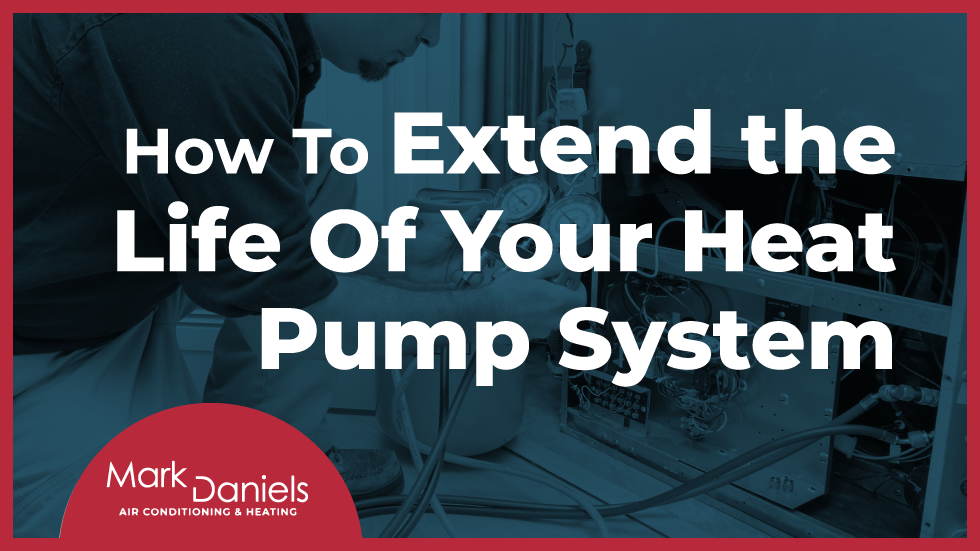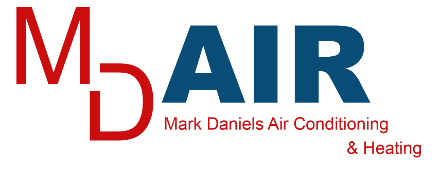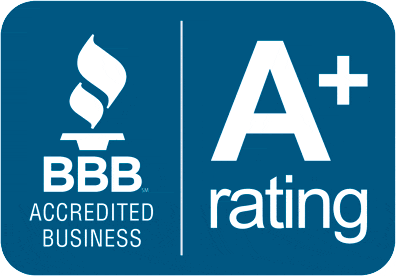Licensed | Bonded | Insured

How To Extend the Life Of Your Heat Pump System
Heat pumps are the newest trend in green technology, reminiscent of solar panels 15 years ago.
While many of us are still learning about this new technology, over 190 million buildings have adopted heat pumps worldwide.
Well, it’s only a matter of time before yours does too.
However, one of the common concerns expressed about heat pumps is that they don’t last long enough, which isn’t inherently true.
Fortunately, we’re here to break that myth.
Let’s talk about how to extend the life of your heat pump so you can stay cool for many summers to come!
How Long Do Heat Pumps Last?
While you may just be hearing about them for the first time recently, heat pumps are not a brand-new technology.
Believe it or not, the first (ground source) heat pump was invented in 1948.
This means we’ve had plenty of time to test their long-term benefits and drawbacks.
Typically, you can expect heat pumps to last for around 15 years.
This isn’t bad considering that most newer oil furnaces last for around 20 years with proper care.
Fortunately, there are ways to get more life out of your heat pump without expensive maintenance bills.
Let’s talk about some strategies.
How to Extend the Life of Your Heat Pump
Heat pumps are one of the best heating/cooling solutions on the market for your wallet and the environment.
Every home should have one, regardless of its climate.
Still, nobody wants to replace their heating and cooling system every decade.
Here’s how to extend the life of your heat pump!
Location, Location, Location
It all starts with where you choose to put your outdoor condenser.
This will have an impact on the longevity of your overall system.
We recommend keeping it close to the building and preferably under an overhang.
Of course, they are built to handle outdoor weather, but some minor protection can help extend their lives.
However, finding a space that meets these conditions and that’s away from heavy foot traffic isn’t doable in every home.
Still, if you can put a makeshift covering over it, it can help extend the life of your unit.
Use a Smart Thermostat
Have you ever noticed that your car gets better gas mileage when you use cruise control, even though it may accelerate more harshly than you would?
It’s because it maintains the same speed.
The same logic applies to heat pumps.
If you constantly have to raise and lower your thermostat, your heat pump will have to work harder.
Over time, this can cause unnecessary wear and tear on your system.
A smart thermostat can help regulate the temperature and improve the efficiency of your heat pump.
Also, this will help conserve energy, saving you money on your electric bill every month and keeping your home at a consistently comfortable level.
It’s a win-win-win.
Follow the Regular Maintenance Schedule
Follow the maintenance schedule in your user manual for the best long-term results.
You can easily do some of this yourself, but you can also hire a professional HVAC technician to help you:
- Check the airflow of your system
- Check refrigerant levels
- Test your heat pump unit for blockages
- Evaluate your electrical connections and service them as needed
- Test the accuracy of your thermostat (important)
- Tighten bolts and expect deterioration
These are all done at routine intervals, and they don’t need servicing too often.
Again, like a car, a little preventative maintenance goes a long way.
Check For Leaks
In the refrigerant ducts or elsewhere in your system, checking for leaks periodically will help extend the life of the system.
Otherwise, your heat pump will have to work harder than it needs to, and it may run out of refrigerant, leading to more serious repairs.
Check For Codes
If your heat pump has a display screen, check it for codes periodically.
The internal computer can sense when there’s an issue with the unit, and much like a car, addressing these issues right away can save you from major repairs later on!
Inspect Your Insulation
An often-overlooked factor is the quality of your home’s insulation.
If your house or living space has poor insulation, then your heat pump may have to work twice as hard to achieve the same level of heat.
Unfortunately, this means it will only live half as long, and that’s if you’re keeping up with maintenance in half of the recommended intervals!
Adding heat pumps and improving your home’s insulation are two of the best home improvements you could make.
Not only for your comfort but also for increasing home value.
Are Heat Pumps Worth It?
Overall, yes.
Heat pumps are undoubtedly worth the price, especially if you take care of them, as they can last for well over 20 years with proper care.
They’re also cheaper to install than oil furnaces on average and substantially cheaper to run than almost any heating source out there.
We say “almost”, but let’s explain.
Wood stoves and pellet stoves, which require much more work, are nearly as affordable to operate as heat pumps, but they are still a little pricier.
However, compared to gas, oil, propane, diesel, and electric resistance heat, there’s no comparison.
To demonstrate how superior (that’s the right word) heat pumps are, let’s weigh out some of the benefits.
Installation Costs
Installing heat pumps in a 2000 sq ft house is substantially less expensive than a furnace.
A wood stove or pellet stove might be cheaper to install if you have an existing chimney, but they likely won’t heat or cool your entire home.
Even if the oil furnace lasts for 20 years and the heat pump lasts for 15 years, the installation costs are still likely to be cheaper over the course of your lifetime.
This is because heat pumps don’t require the same infrastructure and piping as oil or gas heaters do.
Ducts are much easier and cheaper to install.
On top of that, heat pump installations offer a tax rebate of 30% thanks to the Inflation Reduction Act signed into law in August 2022.
If you owe taxes each year, you could save big on your tax bill and electric bill over the next year!
Operating Costs
If electric resistance heaters operate at 100% efficiency, heat pumps operate at 300% efficiency.
No, we aren’t exaggerating. That’s a fact.
Conversely, oil, gas, and propane heaters are lucky to break 80% to 90% efficiency.
The savings on operating costs for a heat pump make the system pay for itself in only a couple of years.
Not only do heat pumps heat your home, but they cool it as well.
Heat pumps typically operate at only half of the wattage as window AC units with comparable BTUs.
This means you can save up to 50% on your cooling costs and 67% or more on your heating costs each year.
Let’s imagine you spend $2000 a year on heating and $500 a year on cooling.
That’s a total savings of $1,583.33 each year.
If you were already planning to install a new heating system, why not spend less on installation for something that saves you that much every year?
Home Value
Heat pumps increase home value, often by more than they cost to install.
Again, we’re not kidding.
Heat pumps are some of the most sought-after fixtures in a home nowadays because of their long-term savings.
Yes, that means that you can save money on installation, receive a 30% tax rebate for installing it, save money on your energy bill each month, and increase your home value.
Find an equivalent no-brainer investment!
Environmental Benefits
Finally, we can’t mention heat pumps without discussing the environment.
The reason for the tax rebate is simple; heat pumps are the cleanest technology we have for heating and cooling our homes and commercial buildings.
Again, they operate at 3x the efficiency and only require electricity to operate.
If you want to improve the health and safety of your home, community, and planet, then forget about electric vehicles.
Heat pumps are the easiest first step to take, as residential heating accounts for up to 38% of greenhouse gas emissions.
This is the easiest step toward net zero you can make.
Start Saving Today
Now that you know how to extend the life of your heat pump, put these tips to use today and get the most out of your unit.
As you can see, heat pumps are the best heating technology out there, and they don’t require much maintenance.
However, if you keep up with its needs, you can stay cool in the Arizona heat!
Stay up to date with our latest tips for homeowners, and don’t hesitate to contact us with any questions or for help with installation and maintenance!
Are you looking to extend the life of your heat pump? Routine maintenance from Mark Daniels AC can keep it running in tip-top shape! Our experienced HVAC experts have been providing heating and cooling service in Gilbert, Mesa and Chandler, AZ, with heat pump, AC, and furnace repairs, maintenance, and replacements since 1996. Call (480) 571-7219 or request service online today!
Read More about Air Conditioning & Heating Tips:
- How to Troubleshoot Common HVAC Problems
- How Much Does a Heater Replacement Cost?
- Heating System Replacement: Most Common Signs It’s Time



